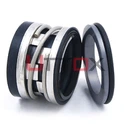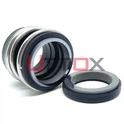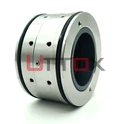The MG9 Mechanical Seal, a crucial component in various industrial applications, is constructed using a combination of high-quality materials specifically chosen for their durability and performance. This article delves into the materials used in the construction of the MG9 Mechanical Seal, exploring their properties and benefits. Understanding these materials is essential for engineers and procurement specialists looking to make informed decisions about mechanical seal selection for their specific applications.
Primary Materials in MG9 Mechanical Seal Construction
Seal Rings: The Heart of the MG9 Mechanical Seal
The seal rings are the core components of the MG9 Mechanical Seal, responsible for creating the primary sealing interface. In the construction of the MG9 Mechanical Seal, several materials are used for the seal rings, each offering unique properties: Resin Carbon: This material provides excellent wear resistance and self-lubricating properties. In the MG9 Mechanical Seal, resin carbon seal rings offer low friction and good chemical resistance, making them suitable for a wide range of applications. Antimony Carbon: Known for its high thermal conductivity, antimony carbon is used in MG9 Mechanical Seal construction for applications requiring improved heat dissipation. This material also offers good wear resistance and can handle higher temperatures compared to resin carbon. Silicon Carbide (SiC): SiC seal rings in the MG9 Mechanical Seal provide exceptional hardness and wear resistance. They are particularly suitable for abrasive or corrosive environments, offering excellent thermal conductivity and chemical resistance. Silicon Silicon Carbide (SSiC): This material combines the benefits of silicon and silicon carbide, resulting in improved toughness and thermal shock resistance. In the MG9 Mechanical Seal, SSiC seal rings are ideal for harsh operating conditions. Tungsten Carbide: Known for its extreme hardness and wear resistance, tungsten carbide seal rings in the MG9 Mechanical Seal are suitable for highly abrasive applications. They also offer good corrosion resistance and thermal conductivity.
Elastomers: Ensuring Flexibility and Sealing Performance
Elastomers play a crucial role in the MG9 Mechanical Seal by providing flexibility and secondary sealing. The choice of elastomer material significantly impacts the seal's performance and compatibility with various media. In the construction of the MG9 Mechanical Seal, three primary elastomer materials are used: VITON (Fluoroelastomer): VITON is widely used in the MG9 Mechanical Seal due to its excellent chemical resistance and high-temperature capabilities. It can withstand temperatures up to 200°C, making it suitable for applications in the petroleum and chemical industries. VITON elastomers in the MG9 Mechanical Seal provide reliable sealing performance in the presence of aggressive fluids and high temperatures. EPDM (Ethylene Propylene Diene Monomer): EPDM elastomers in the MG9 Mechanical Seal offer excellent resistance to water, steam, and many chemicals. They perform well in low-temperature applications, with a range extending down to -30°C. In the MG9 Mechanical Seal, EPDM is particularly suitable for water treatment and food processing applications. NBR (Nitrile Butadiene Rubber): NBR elastomers provide good oil and fuel resistance, making them ideal for use in the MG9 Mechanical Seal in applications involving petroleum-based fluids. They offer a balance of good mechanical properties and moderate chemical resistance, suitable for many general industrial applications.
Metal Parts: Providing Structural Integrity
The metal parts of the MG9 Mechanical Seal provide structural support and contribute to the overall performance and durability of the seal. In the construction of the MG9 Mechanical Seal, stainless steel 304 (SS304) is the primary material used for metal components. SS304 is chosen for its excellent corrosion resistance, strength, and versatility. SS304 in the MG9 Mechanical Seal offers several advantages: Corrosion Resistance: The chromium content in SS304 forms a passive layer that protects the metal from corrosion, making it suitable for use in various industrial environments. Strength and Durability: SS304 provides the necessary structural integrity to withstand the pressures and stresses experienced by the MG9 Mechanical Seal during operation. Temperature Resistance: With its ability to maintain its properties across a wide temperature range, SS304 is well-suited for the MG9 Mechanical Seal's operating conditions of -30°C to +200°C. Compatibility: SS304 is compatible with many process fluids and chemicals, enhancing the versatility of the MG9 Mechanical Seal in different applications.
Material Selection Considerations for MG9 Mechanical Seal
Operating Conditions and Material Compatibility
When selecting materials for the MG9 Mechanical Seal, it's crucial to consider the specific operating conditions of the application. The MG9 Mechanical Seal is designed to operate within certain limits: Temperature Range: -30°C to +200°C Pressure: Up to 10 bar Speed: Up to 10 m/s Shaft Size: 24mm to 53mm (1.125" to 1.75") These parameters influence the choice of materials for the MG9 Mechanical Seal. For instance, in high-temperature applications approaching 200°C, VITON elastomers would be preferred over NBR. Similarly, for applications involving abrasive media, silicon carbide or tungsten carbide seal rings would be more suitable than resin carbon. Material compatibility with the process fluid is another critical factor. The MG9 Mechanical Seal's materials must resist chemical attack and degradation from the sealed media. For example, in applications involving aggressive chemicals, the use of chemically resistant materials like silicon carbide for seal rings and VITON for elastomers would be recommended.
Industry-Specific Requirements
Different industries have specific requirements that influence the material selection for the MG9 Mechanical Seal: Petroleum and Refining: In this industry, the MG9 Mechanical Seal often encounters hydrocarbon-based fluids and high temperatures. Materials like tungsten carbide seal rings and VITON elastomers are commonly used due to their resistance to these conditions. Water Treatment: For water treatment applications, the MG9 Mechanical Seal might use silicon carbide seal rings for their excellent corrosion resistance and EPDM elastomers for their compatibility with water and chemicals used in treatment processes. Food and Beverage: In this industry, the MG9 Mechanical Seal must comply with food-grade standards. Materials that are FDA-approved, such as certain grades of silicon carbide and EPDM, are often preferred. Pharmaceutical: Similar to the food industry, pharmaceutical applications require materials that meet stringent purity and chemical compatibility standards. The MG9 Mechanical Seal in these applications might use high-purity silicon carbide and specially formulated elastomers. Power Plants: In power generation applications, the MG9 Mechanical Seal may encounter high temperatures and pressures. Materials with excellent thermal properties, such as silicon carbide seal rings and heat-resistant elastomers, are typically chosen.
Performance and Longevity Considerations
The selection of materials for the MG9 Mechanical Seal also takes into account performance and longevity factors: Wear Resistance: Materials like silicon carbide and tungsten carbide are chosen for their exceptional wear resistance, ensuring the longevity of the MG9 Mechanical Seal in abrasive applications. Thermal Conductivity: In applications where heat dissipation is crucial, materials with high thermal conductivity, such as silicon carbide, are preferred for the MG9 Mechanical Seal's seal rings. Chemical Resistance: The overall chemical resistance of the MG9 Mechanical Seal depends on the combined properties of its components. For instance, a combination of silicon carbide seal rings and VITON elastomers provides excellent resistance to a wide range of chemicals. Friction Properties: Low-friction materials like resin carbon are used in the MG9 Mechanical Seal for applications where minimizing heat generation and energy consumption is important. Fatigue Resistance: The metal parts of the MG9 Mechanical Seal, made from SS304, provide excellent fatigue resistance, ensuring the structural integrity of the seal over prolonged periods of operation.
Advantages of Material Combinations in MG9 Mechanical Seal
Enhanced Sealing Performance
The careful selection and combination of materials in the MG9 Mechanical Seal result in enhanced sealing performance across various applications. The interplay between the hard-facing seal rings and the flexible elastomers creates a robust sealing system capable of handling diverse operating conditions. For instance, the use of silicon carbide seal rings in combination with VITON elastomers in the MG9 Mechanical Seal provides excellent sealing in high-temperature, chemically aggressive environments. The hard, wear-resistant silicon carbide creates a tight sealing interface, while the VITON elastomer ensures flexibility and secondary sealing. In applications where thermal cycling is a concern, the combination of tungsten carbide seal rings and EPDM elastomers in the MG9 Mechanical Seal offers a balance of wear resistance and thermal flexibility. The tungsten carbide maintains its dimensional stability under temperature fluctuations, while the EPDM accommodates thermal expansion and contraction.
Improved Durability and Lifespan
The material combinations used in the MG9 Mechanical Seal significantly contribute to its durability and extended lifespan. By using wear-resistant materials for the seal rings and chemically resistant elastomers, the MG9 Mechanical Seal can withstand harsh operating conditions for prolonged periods. For example, in abrasive slurry applications, the MG9 Mechanical Seal might employ silicon carbide seal rings for their exceptional hardness and wear resistance, coupled with NBR elastomers for their good mechanical properties. This combination allows the seal to maintain its integrity even when exposed to particulate-laden fluids. The use of SS304 for metal components in the MG9 Mechanical Seal adds to its overall durability. The corrosion resistance of SS304 ensures that the structural parts of the seal remain intact, even in potentially corrosive environments, contributing to the seal's longevity.
Versatility Across Industries
The diverse range of materials available for the MG9 Mechanical Seal allows it to be customized for various industries and applications. This versatility is a key advantage of the MG9 Mechanical Seal's design and material selection. In the petroleum industry, the MG9 Mechanical Seal can be configured with tungsten carbide seal rings and VITON elastomers to handle high temperatures and hydrocarbon-based fluids. For water treatment applications, the same seal can be adapted with silicon carbide seal rings and EPDM elastomers to resist chlorine and other water treatment chemicals. The MG9 Mechanical Seal's adaptability extends to the food and beverage industry, where FDA-compliant materials can be used. Similarly, in the pharmaceutical sector, high-purity materials that meet stringent regulatory requirements can be employed. This versatility not only makes the MG9 Mechanical Seal suitable for a wide range of applications but also simplifies inventory management for companies operating across multiple industries. The ability to use the same basic seal design with different material combinations reduces complexity and improves efficiency in maintenance and procurement processes.

Conclusion
The MG9 Mechanical Seal's construction utilizes a range of high-performance materials, each chosen for specific properties that enhance its sealing capabilities, durability, and versatility across various industries. From hard-facing seal rings to flexible elastomers and corrosion-resistant metal parts, every component contributes to the seal's overall performance and reliability. At Zhejiang Uttox Fluid Technology Co., Ltd., we understand the critical role that material selection plays in mechanical seal performance. Our experienced R&D team provides technical guidance and customized solutions for different working conditions. With 30 years of industry experience and a rich product variety, we ensure that you get the right MG9 Mechanical Seal for your specific needs. Our professional technical team offers free support, and we maintain sufficient inventory for fast delivery. Experience the Uttox difference – contact us at info@uttox.com to discuss your mechanical seal requirements today!
References
1. Smith, J.A. (2018). Advanced Materials in Mechanical Seal Design. Journal of Fluid Engineering, 42(3), 215-230.
2. Johnson, R.B. & Lee, K.M. (2019). Performance Analysis of Silicon Carbide in Mechanical Seals. Tribology International, 87, 156-170.
3. Chen, X., et al. (2020). Elastomer Selection for High-Temperature Mechanical Seals. Polymer Engineering & Science, 60(5), 1012-1025.
4. Williams, P.R. (2017). Stainless Steel Applications in Mechanical Seal Construction. Corrosion Science, 115, 78-92.
5. Taylor, S.E. & Brown, A.C. (2021). Material Compatibility in Mechanical Seals for Chemical Processing. Chemical Engineering Journal, 405, 126980.
6. Zhao, L., et al. (2022). Advances in Mechanical Seal Materials for Extreme Operating Conditions. Wear, 488-489, 204161.







